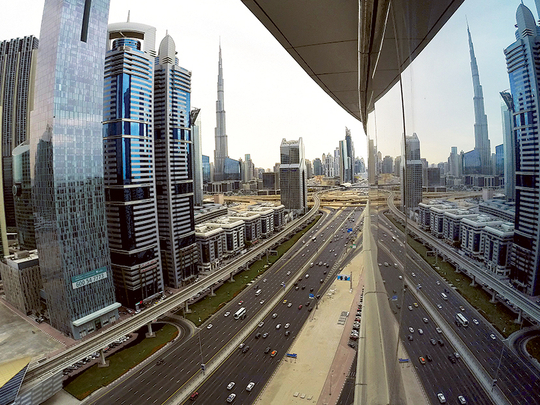
Dubai
For the local property market and those outside, there are good tidings — 40 per cent high networth investors in the UAE could be looking to widen their exposure to this asset class, according to a survey carried out by the consultancy Knight Frank. More important for the UAE’s own property market, a third of these investments are likely to be made locally.
In fact, as per the survey, an average 35 per cent of UAE based investors’ investment portfolios were allocated to real estate interests. Of this, ‘60 per cent increased their allocation to property last year,’ the report adds. ‘In 2015, 60 per cent [are] expected to leave their allocation unchanged, and 40 per cent expected to increase it.’
In Knight Frank’s calculations, ‘high networth investors’ are those with an investment income of $1 million (Dh3.67 million) at their disposal, while those tagged as ‘ultra HNWI’ have $30 million and over to spread around.
It could be that such wealth can be quite a cushion even in times of low growth prospects for the global economy. Seventy-three per cent of these individuals were expecting their wealth to grow further this year. While 20 per cent felt it would remain the same, only 7 per cent expected a decline in networth.
All manner of real estate asset classes interest these investors — residential comes out on top, followed by offices, retail and hotels.
It is clear that real estate continues to be the first port of call with wealthy investors trying to secure stable yields from their outlays. For these high net worth individuals, family/succession issues topped as their primary concern, while the continuing regional crises also has them worried.
The “scrutiny” of their wealth is another of their peeves, as is the repeat instances of cybercrime and online piracy.
Of the investment UAE’s wealthy have already committed, 27 per cent are locked into their primary residences. These individuals on average own more than three homes, over half (52 per cent) were considering purchasing another home in the next 12 months, with equestrian and ski properties especially appealing.
‘The most important reasons given for UAE-based HNWIs wanting to move included quality of life/health (87 per cent), security (67 per cent) and political issues (67 per cent).
Globally, private investors accounted for a quarter of all commercial property deals last year, pumping in an estimated $153 billion. ‘Many of these transactions were funded by ultra HNWIs through family-owned funds, companies or private offices,’ the Wealth Report finds. (In 2013, individual investors’ contribution to commercial realty deals was $143 billion.)
“Ultra HNWIs are adopting increasingly sophisticated investment strategies, and sometimes this approach involves the kind of active management previously restricted to institutions and funds,” said James Roberts, Chief Economist at Knight Frank. “Examples include refurbishment and development projects — where others may see down-at-heel neighbourhoods, he sees opportunities for regeneration and social change.”
The report finds that the wealthy are ‘looking beyond prime or trophy offices and retail space as a safe haven for their funds; they are prepared to look up the risk curve to non-core locations’.
‘An increased risk appetite may mean moving outside a capital city’s CBD (central business district) area, where yields have become increasingly compressed, or heading into secondary cities where better value and higher returns are available,’ the report adds. ‘More peripheral markets such as Ireland and Spain are benefiting from this trend.
‘Demand for alternative property assets is also growing, and is leading to more private investment into business-critical opportunities like health care and student accommodation.’












